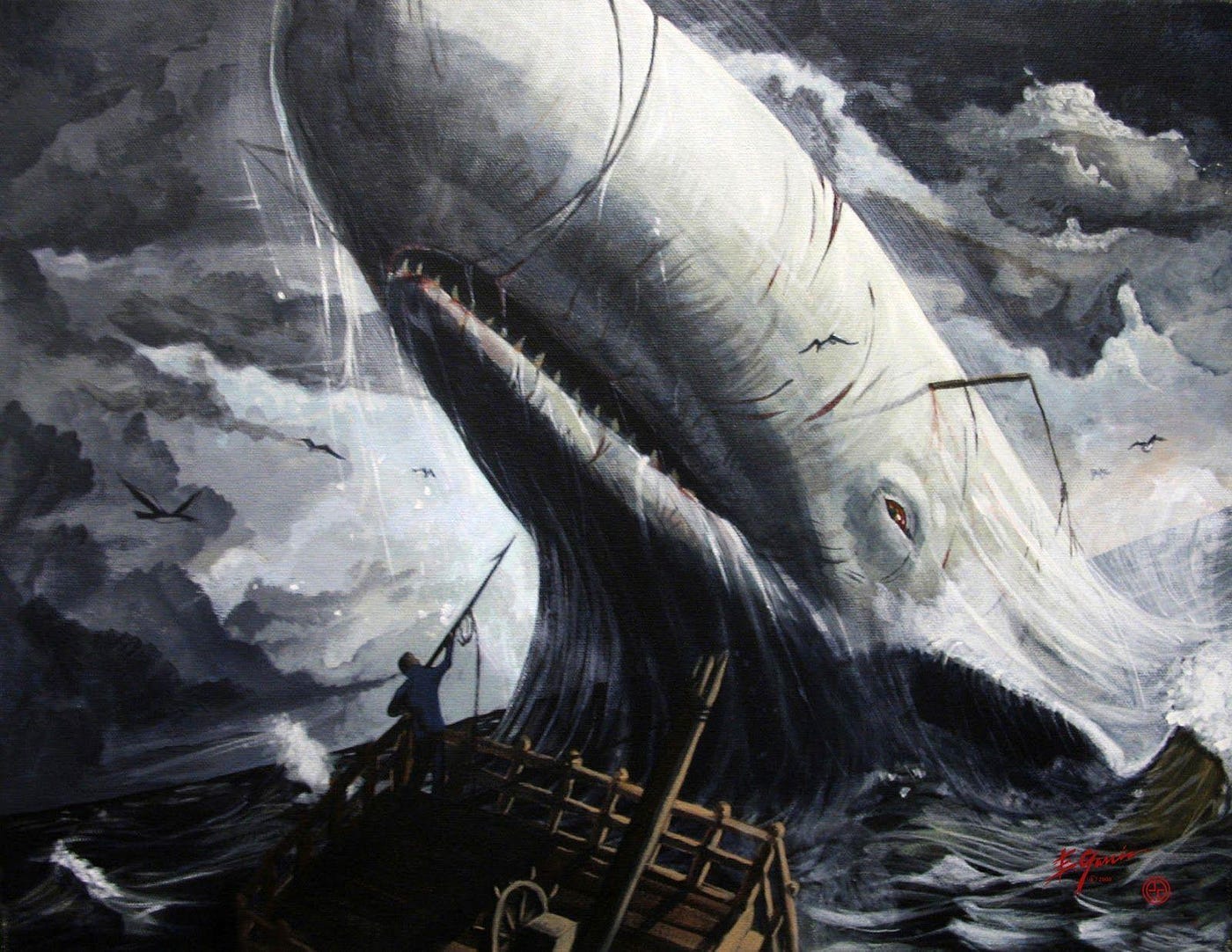3 Reasons to Read "Moby-Dick" This Summer
Plus, details for signing up and our week-by-week reading schedule
This newsletter is for both free and paid subscribers.
Few books have endured in American history in the same way as Herman Melville’s Moby-Dick. Published in 1851, it’s admittedly a weird and long book, but its rewards make it well worth the journey — and then some.
For the next three and a half months or so, we’ll sail our way through this all-time classic story. Read below for more on this novel’s importance, how to get signed up, and our reading schedule.
1. Moby‑Dick is the ultimate allegory of obsession, ambition, and the hunt for meaning
We all have our white whales — those goals or projects that we continue to chase long after prudence (and/or our loved ones) beg us to let go. Captain Ahab turns that idea up to “maximum.” His single‑minded pursuit of the great whale shows what happens when obsession slips from its moors: morale tanks, good sense evaporates, the ship veers off course, and your very life is at stake.
Melville reminds us that mania can be scary and thrilling and clarifying — and can burn everything in its path. That tension makes Moby‑Dick a crash course in self‑awareness: How hard am I chasing whatever it is that I’m after, and what am I willing to sacrifice along the way?
2. Moby-Dick celebrates the value of the weird and tangential
If you’ve ever gone down a Wikipedia rabbit hole just to look up one thing and resurfaced hours later as an amateur expert on 18th century pirate law, you’ll be right at home here. Melville takes detours — long, gloriously nerdy detours — into whale anatomy, shipboard slang, and even the finer points of chowder. Instead of feeling like filler, though, these tangents add texture. They slow us down as readers, letting the story breathe and giving us space to wonder. They don’t serve the plot, and that’s okay!
In a world that worships hot takes and bullet‑point summaries (count me in that group, at times), Melville’s digressions are a nudge towards depth. They prove that going off-topic doesn’t equate to wasted time; in fact, that’s sometimes where the richest insights hide. If (when?!) you finish this novel, you’ll find yourself a little more patient with complexity and maybe a little more forgiving of your own conversational tangets.
3. Moby-Dick offers a beautiful, unsentimental look at the natural world
Before Planet Earth wowed us, Melville painted the sea in prose just as vivid. Storms roll in like stage villains, whales breach with cathedral‑level grandeur, and even the quiet moments feel charged with something awe-inspiring. Crucially, though, he never turns nature into a Disney postcard. The ocean and its creatures are indifferent — and the crew’s livelihood depends understanding that.
This realism matters today, when appreciating nature often means curating an Instagram shot of our hike. I’m very guilty of that one, myself. Melville sees the ocean as it is: magnificent, beautiful, sometimes lethal. His strikes a balance of wonder and honesty that gives us a realistic lens for appreciating nature in every sense of the word.
Subscribe Today!
When you subscribe for just $5/month (or $50/year), you’ll get the following:
Weekly recaps with background, contextual material, and highlights from that week’s chapters
Access to our robust weekly discussions, where you’ll get invaluable insights from other readers
The accountability that you sometimes need to read an all-time classic book
Reading Schedule
Our reading schedule starts on Sunday, June 15 and we’re reading ~40 pages per week (your specific edition may vary). Keep in mind that the reading schedule is just a guideline. Read ahead if you feel like it, or save a couple of weeks of reading for a single sitting.
The idea is not to have a rigid system but rather a rough guide so that the recaps and discussions make sense.
Here’s the Google Sheets link to the schedule.
Questions? Comments? Shoot me a note. Can’t wait to start reading!
-Jeremy




I’m in! I did War & Peace, Lonesome Dove, and A Tree Grows in Brooklyn, and the discussions made them all so much richer. Looking forward to another Big Read.
This will be my second time around with this book, and guys it is worth it.